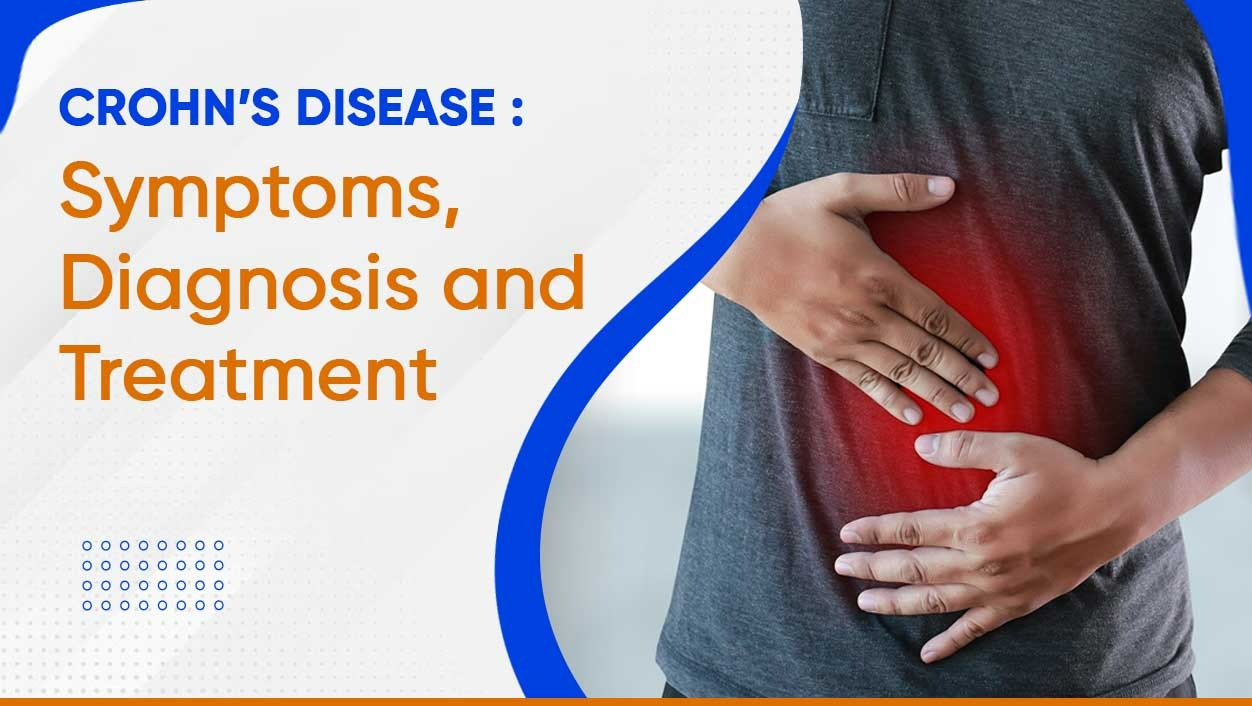Crohn’s disease is a long-lasting illness that makes the digestive tract inflamed. Crohn’s disease can cause a lot of pain and other symptoms, but there are medicines that can help.
Crohn’s disease affects people who have gastrointestinal aches, spasms, diarrhoea, weight loss, and rectal bleeding for long periods of time. Irritable bowel illness is a term used to describe a range of inflammatory diseases of the digestive tract. Periods of active symptoms are followed by periods of remission when the digestive system is inflamed. Men and women are equally affected by the disorder, which can strike at any age but it is most common in persons in their 20s and early 30s. Although there is no cure for Crohn’s disease, managing its symptoms can help people with the disease live more active lives.
Gaining a better understanding of Crohn’s disease:
Once the food has been digested, the intestines’ major purpose is to absorb excess water and minerals. Inflammation of the intestines in Crohn’s disease disrupts the basic functioning of the intestines, particularly water absorption, causing diarrhoea.
From the mouth to the anus, Crohn’s disease can affect any region of the gastrointestinal tract or digestive tract. The disease, however, most commonly involves the small and large intestines. Inflammation of the intestine can spread to deeper layers, affecting the entire width of the intestinal lining. Crohn’s disease causes swelling in portions of the intestine, which can restrict the movement of food through the digestive tract. Ulcers can form anywhere around the digestive tract as a result of chronic inflammation.
Crohn’s disease is categorised into distinct categories depending on which part of the gastrointestinal system is affected.
1.Ileocolitis is a condition that affects the small intestine and a portion of the large intestine.
2.Ileitis is a condition in which the ileum becomes inflamed
3.Gastroduodenal- It involves Stomach and duodenum
4.Jejunoileitis- It is a condition in which the jejunum is inflamed
Crohn’s disease causes:
Crohn’s disease has no known cause, according to researchers. However, they believe that Crohn’s disease is caused by a mix of hereditary factors and an improperly functioning immune system.
Role of the Immune system:
Inflammation and injury to the intestine can result from an inappropriate immune reaction to normal microorganisms in the intestine.
Heredity – Because Crohn’s disease runs in families, genes are thought to play a role. Simultaneously, it was discovered that many persons with Crohn’s disease have no family history of the condition.
Tobacco use – Tobacco use has been shown to double its risk of acquiring Crohn’s disease. Smoking has also been linked to an increase in disease activity.
Crohn’s disease symptoms:
The following are the most common Crohn’s disease symptoms:
1.Diarrhoea
2.Cramps and abdominal pain
3.Blood in stool
4.Exhaustion
5.Loss of weight
6.Fever, anaemia, joint pain or discomfort, eye pain and redness, vomiting, and loss of appetite are some of the other signs.
Crohn’s disease diagnosis:
The following are symptoms of Crohn’s disease:
1.Review of symptoms and examination to rule out abdominal bloating.
2.To obtain detailed images of the small intestine or colon, imaging procedures such as X-rays, CT scans, or MRI are used.
3.A narrow, illuminated tube called an endoscope is used to inspect the inside of the colon during colonoscopy or flexible sigmoidoscopy.
4.Endoscopy of the upper gastrointestinal tract (GI tract) to examine the mouth, oesophagus, stomach, and small intestine.
5.A biopsy is a procedure in which a sample of tissue is taken and analysed for symptoms of inflammation.
6.In order to check for blood and symptoms of illness in the stool sample, it is subjected to a stool analysis.
Crohn’s disease treatment:
Crohn’s illness has no known cure. The goal of treatment is to minimise inflammation in the intestines, alleviate symptoms, and avoid disease progression and consequences.
Medications:
Inflammation can be controlled with anti-inflammatory drugs and steroids.
Immunosuppressive drugs are used to control an overactive immune system.
To inhibit the immunological response, biologics and harsher medicines are used.
In the event of an infection, antibiotics are prescribed.
Anti-diarrhoea medications and hydration.
Bowel rest entails a liquid diet that provides all of the nutrients required by the body. For several days, bowel rest may entail not eating or drinking anything. This gives the intestines a time to relax and recover.
Surgery:
When alternative treatments fail, surgery may be required to cure problems and relieve symptoms. In the case of blockages or bleeding, surgery entails removing the affected portion of the intestine.
Changes in lifestyle can help you manage Crohn’s disease:
Changes in one’s lifestyle can assist to alleviate symptoms and reduce flare-ups. These are some of them:
1.Dietary modifications
2.Frequently eating light meals
3.Eating a low-fat, low-carbohydrate diet
4.Carbonated beverages should be avoided.
5.Limiting the consumption of dairy products
6.High-fibre foods should be avoided.
7.Drinking a lot of water
8.Smoking cessation
9.Regular exercise is essential.
10.Stress management.
Conclusion:
Flare-ups of Crohn’s disease are unanticipated and can have a negative impact on one’s quality of life. As a result, it’s critical to keep disease activity under control and the disease in remission. To control Crohn’s disease symptoms and prevent complications, a gastroenterologist can provide the appropriate treatment as well as healthy lifestyle adjustments. Dietary modifications, along with stopping smoking, regular exercise, and stress management, are the most common lifestyle improvements.
Want to know more? Connect with our specialist today!










